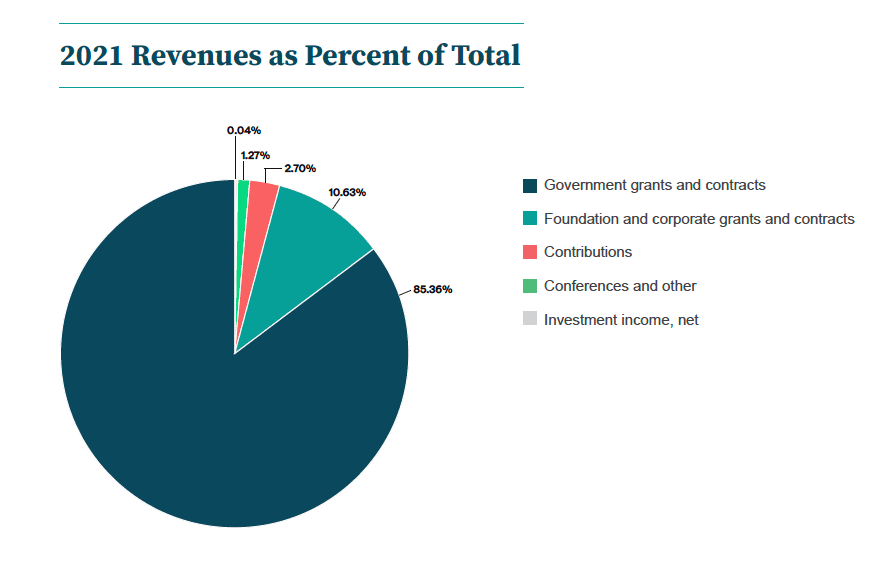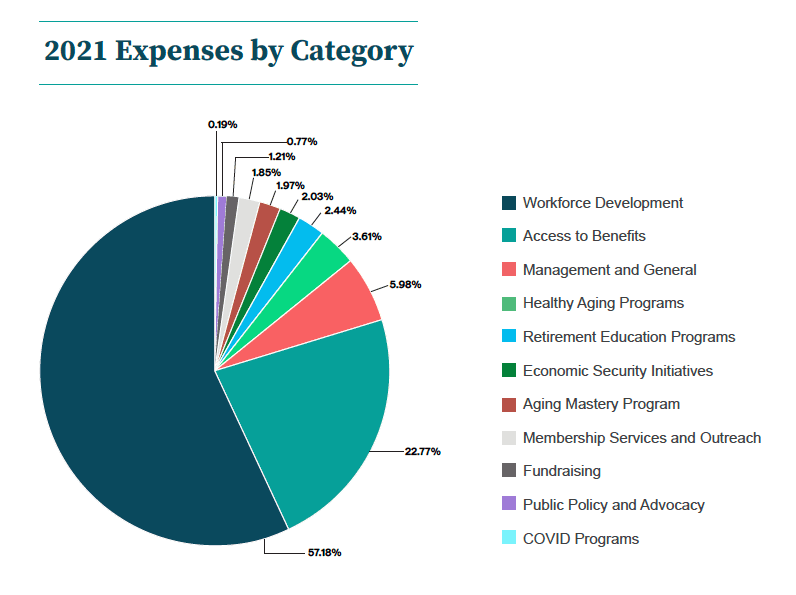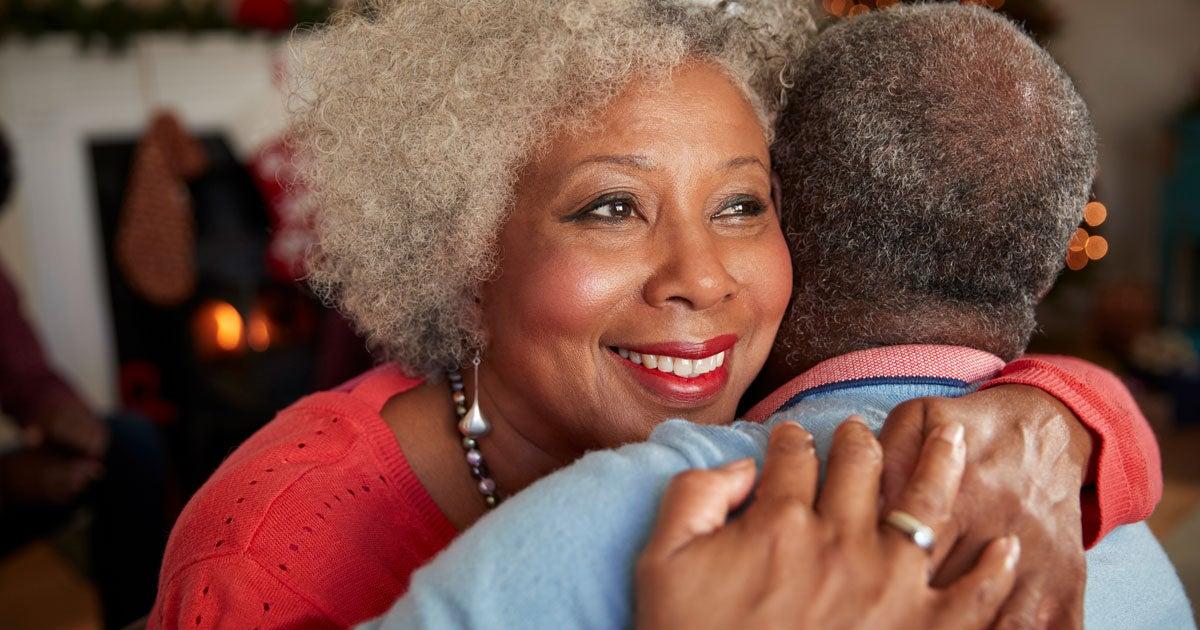NCOA's 2021 Annual Report

NCOA is the national voice for every person’s right to age well. Working with thousands of national and local partners, we provide resources, tools, best practices, and advocacy to ensure every person can age with health and financial security. Founded in 1950, we are the oldest national organization focused on older adults.
Every year, NCOA releases an Annual Report that describes the programs, accomplishments, societal impact, and progress. Learn about the work we do, the people we serve, and why aging well matters now more than ever by reading the highlights below and downloading the 2021 report below.
Health: Chronic Disease and Falls Prevention
Through a national network of community partners and online tools, NCOA delivers comprehensive, integrated services that improve the health of millions of older adults. A few FY21 higlights:
- Continued to provide leadership, guidance, and technical assistance to support state and community-based organizations across the U.S. in expanding CDSME programs and embedding them in the nation’s health and long-term services and supports systems. This included support of 47 CDSME grantees funded by the U.S. Administration for Community Living/Administration on Aging (ACL/AoA) through the Prevention and Public Health Fund, part of the Affordable Care Act.
- Managed the largest CDSME program database in the U.S. During this time period, 13,328 people in 33 states participated in community-based and virtual CDSME programs. States partnered with 232 community organizations to host 1,659 CDSME workshops at 419 unique implementation sites.
- NCOA and the Falls Free Initiative led the 13th annual Falls Prevention Awareness Week (FPAW) and celebrated over a decade of empowering older adults with the confidence to protect themselves from fall-related injuries. National 2020 FPAW awareness and media efforts reached an estimated 380 million people. At the state and community level, State Falls Prevention Coalitions members reached 29 million individuals through education, awareness, and advocacy efforts, as well as falls risk screenings and falls prevention programs. NCOA surveyed state FPAW participation and published the results in an impact report.
Economic Security: Benefits Access, Mature Workers, Economic Casework, Home Equity, and Medicare
NCOA boosts the economic security of millions of vulnerable, low-income older adults through our online tools and a national network of community partners. A few FY21 highlights:
- NCOA supported 87 Benefits Enrollment Centers (BECs) that help low-income Medicare beneficiaries access all the benefits they may be missing. The BECs helped 162,264 people submit 276,207 applications for benefits worth over $450 million.
- BenefitsCheckUp® (BenefitsCheckUp.org), NCOA’s free online tool that connects individuals to benefits programs, helped 432,336 people enroll in public and private benefits worth an estimated $1.23 billion.
- As part of the Senior SNAP Enrollment Initiative funded by the Walmart Foundation, 40 community organizations assisted 20,173 low-income older adults in applying for the Supplemental Nutrition Assistance Program (SNAP).
- The Senior Community Service Employment Program (SCSEP) served 4,093 participants who provided over 1.6 million hours of community service, and the program placed 392 trained participants in jobs.
- More than 725,805 individuals learned about Medicare coverage and costs through NCOA’s educational web content.
- Over 4,700 people had the opportunity to receive professional counseling by a licensed Medicare advisor from a trusted partner that meets NCOA’s Standards of Excellence.
Public Policy and Advocacy
NCOA is a national voice for older adults and the organizations that serve them. Our goal is to protect and strengthen major public programs, particularly for disadvantaged and vulnerable older adults. A few FY21 higlights:
- Joined with key coalition partners to secure additional COVID-19 pandemic relief via the American Rescue Plan to invest $12.7 billion in Medicaid home and community-based services (HCBS), enabling more low-income older adults and people with disabilities to receive care at home with their families instead of in nursing homes. This provided a 10% boost in the federal contribution to states. The advocacy effort was led by the Disability and Aging Collaborative—a coalition NCOA formed and co-chairs. The law also provided $1.4 billion for Older Americans Act (OAA) programs and resources, including a new $44 million investment in healthy aging.
- Led advocacy efforts that successfully increased annual funding for Medicare low-income outreach and enrollment efforts from $37.5 million to $50 million for the next three years. This included a $3 million increase for each of the next three years for NCOA’s Center for Benefits Access.
National Institute of Senior Centers
NCOA’s National Institute of Senior Centers (NISC) strengthens senior centers by promoting best practices, advocacy, research, and the nation’s only national standards and accreditation program. A few FY21 highlights:
- Celebrated 19 senior centers’ completion of the National Senior Center Accreditation process, a self-guided and peer reviewed process that ensures a senior center meets the highest standards of practice, and established an online portal for engagement, simplifying the process and creating data and best practice collection capacity.
- Convened a NISC Leadership Collaborative, mobilizing the network with representatives from across the nation.
Aging Mastery®
NCOA created Aging Mastery to help older adults build their own playbook for aging well. Aging Mastery comes in two formats: Aging Mastery Program® (AMP) classes and a self-directed Aging Mastery® Starter Kit. Both versions provide a comprehensive and fun approach to positive aging by focusing on key aspects of health, finances, relationships, personal growth, and community involvement. A few FY21 highglights:
- Since the program's inception, more than 27,825 people have participated in AMP classes, and 13,666 have received Aging Mastery Starter Kits.
- Served 3,596 older adults in the Aging Mastery Program.
- Expanded Aging Mastery by 107 sites in three additional states. The program now has 750 sites in 38 states.
Financial Highlights and Consolidated Statement of Changes in Unrestricted Net Assets
Fiscal Year 2021 was a larger investment year financially for NCOA. The net operating change in Unrestricted Net Assets (before Pension Plan related adjustments) was a loss of $1,310,201, which is $1,130,259 greater than the prior year’s loss of $179,942. Total Net Assets of NCOA at the end of FY21 amounted to $2,633,327 as shown on the following charts.

The bulk of the net investment was $1.45 million for new digital offerings on NCOA’s Age Well Planner, including Medicare education. NCOA created Age Well Planner to provide a trusted resource for adults to plan their retirement journey and ensure they can meet their goals for healthy aging. While NCOA’s federal programs were relatively safe from pandemic-related financial impacts, we did experience significant impacts in our ability to solicit non-federal funding in FY21. Funders prioritized direct COVID-related activities over other considerations, and the pandemic impacted individual giving campaigns.

Download the annual and financial reports
Ways to Give to NCOA
Your generosity brings us a little closer toward a just and caring society in which each of us, as we age, lives with dignity, purpose, and security. Learn more about the ways you can give to NCOA.
